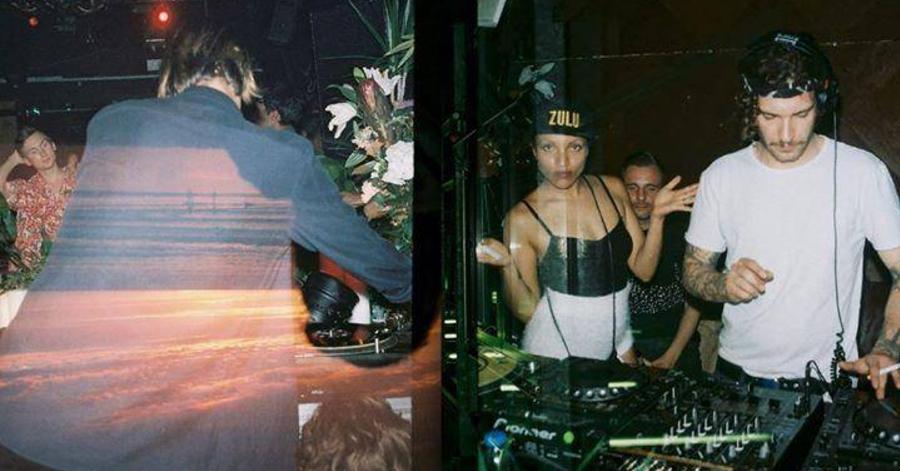 Technicolour’s latest signee and African Acid Is The Future resident Dauwd shares the key factors that influence his singular approach to music.
Technicolour’s latest signee and African Acid Is The Future resident Dauwd shares the key factors that influence his singular approach to music.
The US-born, Wales-raised artist has been releasing music on such noted labels as Ghostly International and Kompakt for almost 6 years now, and his debut album Theory of Colours is about to be released on Ninja Tune’s singles imprint Technicolour.
In addition to making music and touring the world as a DJ, Dauwd is an integral member of the Berlin-based radio show and party ‘African Acid is the Future‘ that has built an increasingly international following, traversing the worlds of electronic, psychedelic and spiritual groove.
This eclecticism permeates his studio approach too. A skilled musical engineer, Dauwd’s ability to balance between genres is admirable. His debut LP was recorded over the course of a year primarily in the Utrecht based Sonar Traffic studio that houses one of the largest collections of vintage synths and other modular equipment in all of Europe. Away from his busy schedule, we wanted to know what influenced this process.
Delay
I think for anyone who makes music, being inspired by the tools we use can be just as influential as the music we listen to. Synthesizers, and the many characters of sound they come in are always considered to be great sources of inspiration to so many artists, and the same goes for any instrument. Delay for me has always been a great interest, and I have found so much to be explored from what could be considered a very simple effect. For me it is much more than an effect, through it comes countless forms of manipulation such spacial effects, sampling, synthesis, rhythmic. I find it is my most versatile tool in my studio, and I have many in my setup I use for all kinds of reasons. Tape delays, BBD’s, digital delays, they all have their own characteristics, and through that they return to you a very characterful sound. So often will I be in the studio playing with a sound that only until I put it through a form of delay that the idea starts to come. Reggae dub and eventually dub techno have been very much inspired by delay (predominantly tape), and similarly a sound in classic Electro is attributable to early digital delay. The classic Joy Division album Substance was characterised by the producer Martin Hannet’s fascination with delay, from what I read the AMS Digital Delay was his favourite.

Library Music
In the 60s and 70s there was a whole world of unknown and inventive musical artists making music for film, television, and radio. The records were generally exploited for these reasons only and I guess they gave a sort of freedom to their purpose. “There is a striking originality to library records from that time because they were all about the search for new sounds. Back then, musicians weren’t told what to do. Big companies also weren’t so obsessed with focus groups and demographics, so musicians were allowed to have more open-ended adventures. The result is music that sounds like nothing else.” (J.Cavanagh, Glo Spot Records). I’ve always found something inspiring about these records, often a 12” will have many little sketches of about half a minute long, weird little ideas, noises, rhythms, even full productions, but always quite odd. I always carry a few in my DJ bag as they are full off possibilities: transitions, layering, and even tracks that work on the dance floor. I have been collecting for many years, but I have noticed they are becoming quite popular at the moment with re-issues which is good because originals tend to fetch crazy high prices from collectors. Granted, not all Library music is great, but there’s some real gold out there.

Atomic Jam
I grew up in very rural North Wales, so there wasn’t much in terms of an electronic music scene to follow, but what little I did have I cherished and will always remember with esteem. I think I first went to a techno club around 2001, it was a few towns away just across the boarder to England and was hardly techno, but there was a DJ, it was loud, and there was ecstasy. I wouldn’t tell my parents where I was going as this sort of thing was forbidden. I think from there I got to know people who knew about electronic music and found out about these coach trips oranised by some guys who lived in the mountains. The coach would go through all the little villages picking up aspiring ravers and take us all the way to Birmingham, about a 4 hour drive, to a party called Atomic Jam at The Que club. For me this was a significant step towards something I thought was important to me and it exposed me to so much, for a child from the hills it was a lot to take in. It was held in an old Methodist Church, and I saw people such as Jeff Mills, Dave Clarke, and even DJ Rush. The coach would wait outside for us until 6am and take us all all the way home. Limitation
Limitation
I have learned from all my time making music that the tools we use themselves are only tools and that ultimately our creativity and ideas depend on our own ability to harness something within ourselves. I have spent many years obsessing over equipment for my studio, and I am lucky to have a lot of great tools to use in my setup, all of which I am very glad to have. But, I have found myself in times where I would come in an be completely fatigued by decisions because of this abundance of choice. So I found giving myself limitations to be really productive, often I would challenge myself to make something only using a single machine or even a single feature within the machine, or finding a small sample and using that exclusively for everything in that track. It’s not the exercise itself that is important it the state of mind it puts you in, it frees up all this space in your head wasted on deciding what else might work and gives you great focus. I think its in essence what inspiration is, the feedback of your environment to stimulate your creativity, and narrowing your environment with your own boundaries I feel can help that.
DJ Residency
My DJ career never really started until I began to release music, from that I am lucky enough to play all over the world, and have learned to play to all kinds of crowds and spaces. But, I must admit that the biggest education in DJing I have had is from having a residency. Playing the same party regularly, to a room full of people coming for the same reason, often the same faces is a great and wonderful challenge. It really taught me how to try to lead a crowd with my music, and really dig and try and do something special for them every time. I think being booked somewhere now, I try to demonstrate what I learn and continue to learn from a residency.





